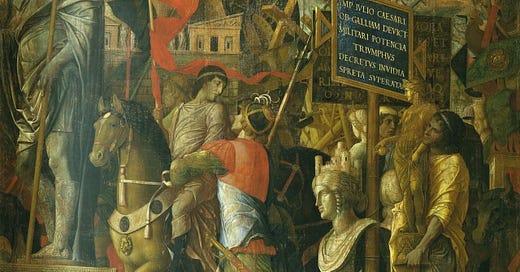Germanicus and Gaius discuss the reassertion of normal political discourse, parallels between the empires of Russia and Byzantium, potential outcomes of the war in Ukraine, and the Italian campaign of the second World War vis-à-vis author (and previous guest of the program) James Holland.
It's the end of the year and a good time to assess where we are in the first century. But the 21st century is also compelling. And so we start there with what is called a transition underway between one presidency and another—between one emperor and another. It has been a pleasure to speak with Germanicus over the years about how the new emperor has been regarded as not worthy, as illegitimate in some fashion.
Either he was elected illegitimately, conducted his work illegitimately, was aided by councilors who are illegitimate—many “illegitimate” remarks.
Most recently, he was pilloried as the end of democracy.
Worse than that, we who supported him were called names. And I understand that's not supposed to upset people, but it lingers in my memory—especially being called a fascist.
Now the word fascis comes from Rome. It's Latin for a bundle of sticks. The simple observation is that a bundle of sticks is stronger than one stick, and it was a sign of the courts of law and of Roman authority. That's what a fascis was for us Romans. But in the 20th century, it became a word that was applied to bullies and brutes and tyrants, especially in Middle Europe.
And so calling the Republican Party or the supporters of Mr. Trump “fascists” seemed particularly odd. There is no basis for it. And I observe now, after the election is over, that perhaps it wasn't a game, perhaps it was sincere. Perhaps the people who called us that name believed that democracy was ending.
It occurs to me reading headlines these days that here's no bite to them the way there was in the first term.
Mr. Trump is a Gracchus Younger; he’s one of the elite who left them and marched over to the plebs assembly and is looking to make reforms, upsetting the senate, upsetting the Blue Elite. Gracchus is normalizing. He's becoming someone who is resented and opposed but not declared illegitimate.
The headlines no longer accuse him of being a stooge of the Kremlin. How do we observe what may or may not be a transformation?
Watch the full conversation above, or listen to an audio version below:
LINKS:
CBS Eye on the World with John Batchelor on YouTube
The John Batchelor Show on Apple Podcasts:
The opinions expressed on this website and on The John Batchelor Show are those of John Batchelor and guests, and not those of CBS News.
Image used from Triumphs of Caesar by Andrea Mantegna (1482-94)













Share this post